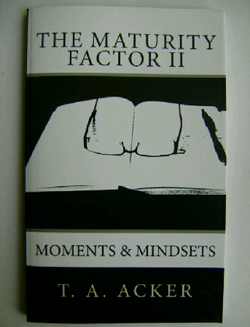From Dreams to Goals
Place your dreams in a mode like academics.
Let prayer become central in your habit,
let your passion reflect your attendance,
let your success represent your grades--
in such a way that as time passes
in your matriculation,
you are closer to graduation,
rather than the first day of class.
(Poem taken from the book, The Maturity Factor II: Moments and Mindsets by T. A. Acker, ©2012, www.amazon.com, www.poetryandsense.com)

 RSS Feed
RSS Feed
